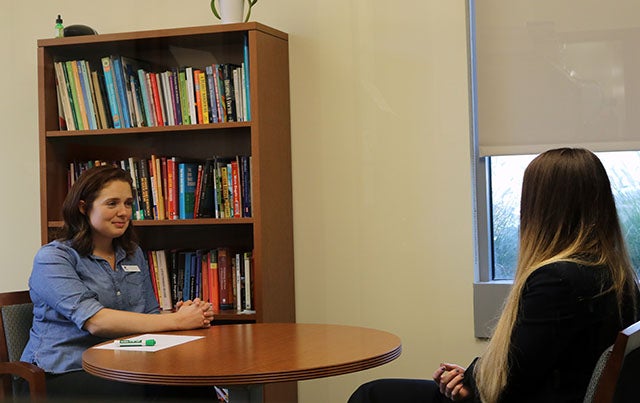Where and How to Get Started Before the Interview
Dress the Part
Be conservative and professional but still comfortable
Types of Interviews to Expect
- One-on-One
- Panel/Committee
- Group
- Lunch
- Performance
- Multiple Mini Interview (MMI)
What are MMIs?
- Involves multiple stations/rooms (2 minutes to read a scenario and 5-8 minutes to execute)
- The evaluation may be based on: how you answer the question, how you emotionally react to the interviewers’ questions, how you consider multiple or possible answers/perspectives, how you respond to opinions that you disagree with
Do Your Research
- Know the program that you are interviewing for
- Know what questions to anticipate
- AAMC Core Competencies, NACE Core Competencies
- Youtube, Reddit, forums.studentdoctor.net (Keep in mind that everyone has different experiences/opinions)
Make a Cheat Sheet
Make a sheet before each interview to review immediately before the interview:
- What specifically excites you about that program?
- What are some of your strengths (with examples) or weaknesses (with how you are improving on them)
- Outline for “Tell Me About Yourself”
- Review any application materials (personal statement, resume)
- Why did you want to pursue ____, as opposed to any other healthcare field?
Practice
You won’t know every question they are going to tell you, but you can practice how you articulate your skills/abilities and use these tools to build answers
- Make an appointment with Career Services
- Practice in front of a mirror
Interview Strategies & Tips – During the Interview
General Tips
- Be nice to everybody and be prompt
- Know where you’re going and how long it will take to get there! Prepare any interviewing necessities
- Expect the unexpected – be flexible
- Take your student interviewer(s) seriously
- Anticipate any things on your application that might concern the interviewer (i.e. poor grades) and have an explanation ready – not an excuse or rationalization
Zoom Interview
- If possible, practice using the platform in advance (Check your window screen and microphone)
- Look at the camera when speaking – not your face
- Pick a quiet space
- Turn off phone and computer notifications
- How is your internet connection?
- Communicate with roommates
- Wear professional attire – don’t just wear your pajamas
- Check the time zone
General Interview Strategies
- What is the question really asking? (Questions can be asked multiple ways)
- Elaborate, but keep your answers relevant and positive
- Give examples to support what you say
- STAR interviewing techniques
Types of Interview Questions
- Questions about you, your qualifications, and/or your application materials
- Behavioral – Tell a story or give a specific example
- Scenario – You are given a hypothetical situation
- Stress – You are asked to complete a task
- Role Play
Qualifications
“Tell me about yourself” → “I’ve reviewed a lot of applications…remind me of who you are, why you’re here, and why I should pay attention to the rest of the interview!”
- Create a structure to body your information
- Give an overview of your qualifications and interest in medicine
- Why have you chosen this career? Where did this interest come from?
“What is your greatest weakness?” → “What are some areas that you will need additional support or development, and how are you working on these areas?”
- Give an honest assessment of what you anticipate the most challenging thing for you to do in medical school or as a healthcare professional
- Finish with what steps you take to improve on this weakness and what strategies you use
Behavioral Questions – Asks you to tell a story or give a specific example
- Situation: Brief background for context
- Task or problem: What were you dealing with?
- Action: What did you do (lots of details!)?
- Result: What was the outcome? If it wasn’t successful, what did you learn?
Scenario Questions – You are given a hypothetical situation and asked what you would do in that situation.
- Google is your friend! Research how professionals in medicine handle these difficult situations
Apply the four pillars of medical ethics:
- Autonomy – How does this show respect for the patient and their right to make decisions?
- Non-Maleficence – Does this harm the patient?
- Justice – What are the consequences of this in the wider community?
- Beneficence – How does this benefit the patient?
After the Interview
Thank You Notes
- Why: Although this won’t make or break your application, this step to express genuine gratitude won’t go unnoticed
- Who do I send it to? Anybody that you felt you had a meaningful conversation with? A representative on behalf of a department?
- The person who coordinated the interview? Those who had lunch or a one-on-one interview with you?
- When to send it: Ideally within 24 hours
- Email or handwritten: Ideally – email first, followed up by a handwritten note
Helpful Resources
- Career Services Interviewing Workshop & Handout
- American Association of Medical Colleges
- Columbia University – Bioethics for Pre-Meds
- Berkeley Pre-Health Advising – MMI Resources
- UW – Ethics in Medicine
- Harvard Office of Career Services
- COBE Career Closet
- Postable
Professional and Graduate School Workshop Series

Don’t miss the opportunity to come to learn how to best prepare for interviews whether it’s for graduate school, professional school, or just your first job after graduation. This workshop was designed and created to get help setting the stage for your interviews. Join the College of Health Sciences Advising and Career Services Staff and learn about best practices to successful interviewing. Hosted on behalf of the Future Physicians’ Club. All professional and graduate school pathways welcome.